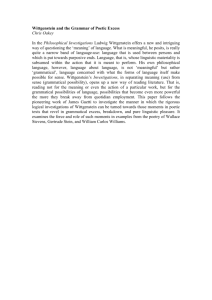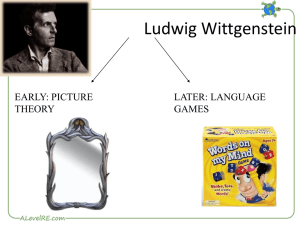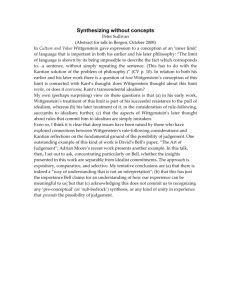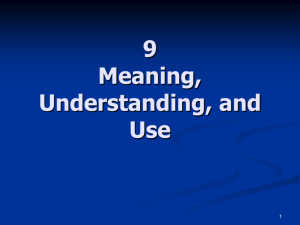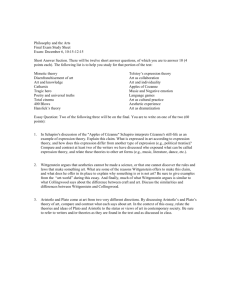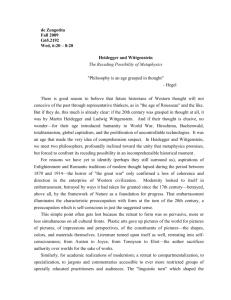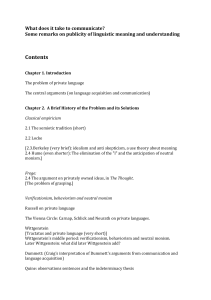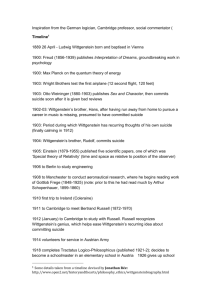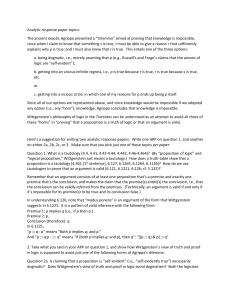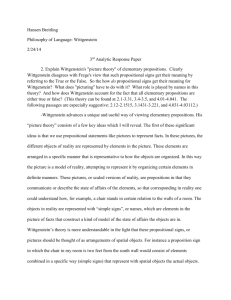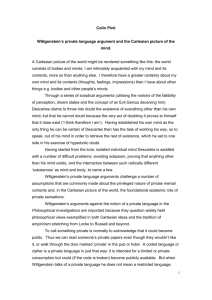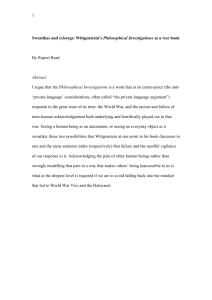Nothing Is More Practical Than A Good Theory
advertisement
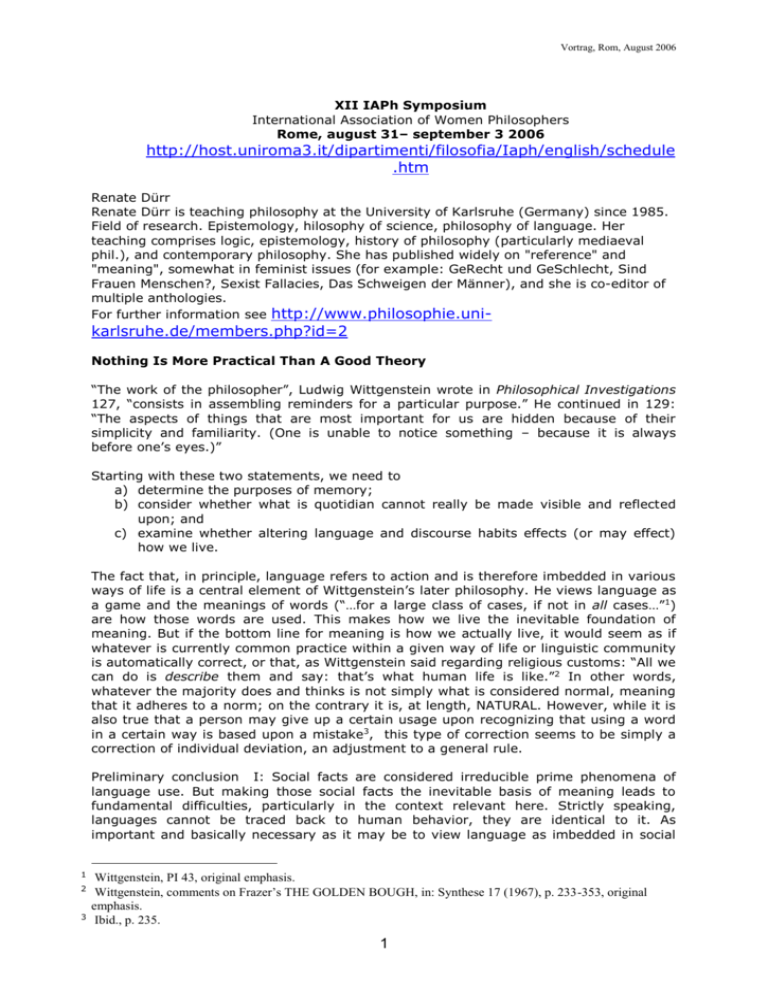
Vortrag, Rom, August 2006 XII IAPh Symposium International Association of Women Philosophers Rome, august 31– september 3 2006 http://host.uniroma3.it/dipartimenti/filosofia/Iaph/english/schedule .htm Renate Dürr Renate Dürr is teaching philosophy at the University of Karlsruhe (Germany) since 1985. Field of research. Epistemology, hilosophy of science, philosophy of language. Her teaching comprises logic, epistemology, history of philosophy (particularly mediaeval phil.), and contemporary philosophy. She has published widely on "reference" and "meaning", somewhat in feminist issues (for example: GeRecht und GeSchlecht, Sind Frauen Menschen?, Sexist Fallacies, Das Schweigen der Männer), and she is co-editor of multiple anthologies. For further information see http://www.philosophie.uni- karlsruhe.de/members.php?id=2 Nothing Is More Practical Than A Good Theory “The work of the philosopher”, Ludwig Wittgenstein wrote in Philosophical Investigations 127, “consists in assembling reminders for a particular purpose.” He continued in 129: “The aspects of things that are most important for us are hidden because of their simplicity and familiarity. (One is unable to notice something – because it is always before one’s eyes.)” Starting with these two statements, we need to a) determine the purposes of memory; b) consider whether what is quotidian cannot really be made visible and reflected upon; and c) examine whether altering language and discourse habits effects (or may effect) how we live. The fact that, in principle, language refers to action and is therefore imbedded in various ways of life is a central element of Wittgenstein’s later philosophy. He views language as a game and the meanings of words (“…for a large class of cases, if not in all cases…”1) are how those words are used. This makes how we live the inevitable foundation of meaning. But if the bottom line for meaning is how we actually live, it would seem as if whatever is currently common practice within a given way of life or linguistic community is automatically correct, or that, as Wittgenstein said regarding religious customs: “All we can do is describe them and say: that’s what human life is like.”2 In other words, whatever the majority does and thinks is not simply what is considered normal, meaning that it adheres to a norm; on the contrary it is, at length, NATURAL. However, while it is also true that a person may give up a certain usage upon recognizing that using a word in a certain way is based upon a mistake3, this type of correction seems to be simply a correction of individual deviation, an adjustment to a general rule. Preliminary conclusion I: Social facts are considered irreducible prime phenomena of language use. But making those social facts the inevitable basis of meaning leads to fundamental difficulties, particularly in the context relevant here. Strictly speaking, languages cannot be traced back to human behavior, they are identical to it. As important and basically necessary as it may be to view language as imbedded in social 1 2 3 Wittgenstein, PI 43, original emphasis. Wittgenstein, comments on Frazer’s THE GOLDEN BOUGH, in: Synthese 17 (1967), p. 233-353, original emphasis. Ibid., p. 235. 1 Vortrag, Rom, August 2006 contexts and to consider social elements as formative, forming, and constitutive for language, as a method for understanding the world the model is insufficient: We should transcend such pragmatic explanation, even though the epistemological theoretical terms for replacing ‘practical terminology’ be not yet available. Various interests are at work at all levels, as it were. And if anything be questioned, then COMMON USAGE. Finally, another central aspect of Wittgenstein’s later philosophy is interpretation, and it plays an important role here, too. Expressions, sentences, images, memories, and so on, demand interpretation. (Consider: “Each picture always remains in need of interpretation, and an interpretation can only create a logical relationship. Because any material relationship that we add to the picture does not show us the intention and still leaves the picture in need of interpretation”.4 This means that we have no good reasons for taking life forms or linguistic communities as invariant grounds for definitions; they themselves may be questioned, because they are not “prior to” language use, but are, themselves, interpretations. Interpretation, in turn, fulfills an important function in memory: “If memory is not peering into the past, how do we know at all that we should interpret it as related to the past? We could remember something and then doubt whether our memory image is a picture of the past or the future. Of course, we could say: I am not seeing the past, I see merely a picture of the past. But how do I know that it is a picture of the past, if that is not essentially part of a memory image. Has experience taught us to interpret these images as pictures of the past? But then, what would “past” be in this context”?! 5 The question we need to discuss is whether memory is ‘stored’ along with its past interpretation, or whether each memory is interpreted anew. Either way, we get different results. And last, but not least: the ‘quotidian’. In spite of feminist efforts - at least wherever German is spoken – it is still ‘normal’ (and thus – as we concluded above: ‘natural’) for household and child rearing to be considered ‘women’s tasks’, for serving to be a womanly virtue (Aristotle sends his greetings), and that it is not ‘normal’ for women to pursue careers – in other words – when they do, they deviate from the norm. A career woman must not only always justify her abandon of the norm, she is also distinguished by a term (‘career woman’) for which there is no male counterpart (‘career man’?) because – and I am only slightly exaggerating at this point - the notion of working outside the home is already part of the concept of being a man. This claim is not inconsistent with Wittgenstein’s thought that the contents of concepts are fixed by usage. Preliminary Conclusion II: Language and discourse have an influence on ways of life only when they are not interpreted in terms of existing practices, but when they question these ways of life and existing usage. Obviously, talking and thinking does not change anything, but nonetheless: nothing is more practical than a good theory. Some Thoughts on a, b, and c – in Reverse Order c) Does changing language induce a change in behavior? Granted, languages change: Words disappear when the things6 they once stood for become unfamiliar, and new words – for innovations and discoveries – find their way into our dictionaries. But that is not so much our concern at the moment. Of greater interest is how gender-defined nouns (and pronouns) and predicates crop up and circulate. Obviously in this respect more, and more extreme changes have been made in written language than in oral usage (in part introduced by equality legislation.) For example, job 4 5 6 Wittgenstein, Philosophical Comments, translated from the Vienna Edition, Vol. 2, p. 292. Wittgenstein, Philosophical Comments, translated from the Vienna Edition, Vol. 1, p. 25, original emphasis. By way of example, nowadays school children hardly know what a sledge is. 2 Vortrag, Rom, August 2006 offers in academic environments often state that “when qualifications are equal, women will be preferred”. The result that often enough women do not get the position is, of course, due to the fact that male applicants were more qualified… Another significant aspect is that feminine forms of many occupational designations and titles and other distinctions are frequently derived from the masculine form by, for example, manipulating the masculine form of the word. In German, for example, this is done by adding the suffix “in” to the stem [Lehrer –> Lehrerin] (and sometimes changing the stem with an umlaut [Bauer –> Bäuerin]). Clearly, attaching the suffix “in” to indicate whether a man or a woman is performing a task is merely a matter of historical development. Yet unfortunately many men and women consider it not a phenomenon of evolving grammar, but an ontological fact. In other words, masculine managers, journalists, and politicians set the standard; feminine managers, journalists, and politicians are a sort of subclass, somehow derived from the standard. Now there are, of course, some occupations fulfilled traditionally, or typically, by women, such as that of the nurse, such that a man doing it is called a “male nurse”. It is not necessary to write “female nurse”, because typically, a nurse is female. In German a male Krankenschwester, however, is not called a Krankenbruder, but is, instead, given an occupational designation of his own, namely, he becomes a Krankenpfleger. Although on the face of it this seems to be simply a grammatical necessity, and although both sexes do the same job – just as a manager and a female manager do – it is worth noting that when a man does what is typically considered a woman’s job he gets a new name for it, while when a woman does what is considered men’s work, that fact is reflected by adding her gender to the occupational designation, either by an adjective, a suffix, or whatever. The masculine form simply continues to carry more social prestige. Understandably, then, in German a woman may prefer to be called “Frau Doktor”, while her male colleagues think of her as a “Doktorin”. A female physician or surgeon in a German hospital simply does not enjoy the same prestige as her male counterparts – patients tend to think of her as a nurse – although female general practitioners with their own offices (family doctors), do get the same social recognition as male physicians with their own practices. Diminished prestige for female medics may be related to the fact that helping and healing are typically “female” activities, or that there are more of them, since girls tend to have higher grade point averages and greater chances of being admitted to studies in medicine.7 Nevertheless, this all seems to indicate two things: a) The facts in themselves (the fact that a large number of successful female physicians exist), rob the linguistic expression of its connotative inferiority; b) Many women did not realize that they were/are the subjects of linguistic discrimination, until factual discrimination was – at least partially – removed. b) Making the quotidian visible, and reflecting on it… One of the phenomena we constantly experience “right before our noses” is people that speak. Some have high, others low voices, some speak loudly, others softly, some scream. Some understand one another, others communicate, and some produce misunderstandings. And, as Wittgenstein says, there exists a multiplicity of language games. Are there women’s language games and men’s language games such that the one excludes the other sex – because of their sex? Of course, we can only answer this question once we know how to phrase it properly, but I believe that it has two correct answers: Yes! And No! Genuinely male language games take place – just as genuinely female language games do – whenever one of the groups occurs without contamination by the other (unmixed groups), in other words when the other group is excluded – in the narrow sense of the word – by nonlinguistic rules (of the game), being institutional or situational rules. Telling dirty jokes or gossiping about a cinema star’s fourth marriage are not 7 A similar phenomenon is observable among lawyers in government positions. Since getting a position depends largely on one’s final grade at the bar examination, and women tend to get higher grades, remarkably many women hold such positions. 3 Vortrag, Rom, August 2006 strictly speaking men or women’s games, they are simply language games called “telling dirty jokes” or “gossiping”. Under the premise that ways of living and language games (in the wide sense) are identical, what we need to investigate is whether there are specifically female or male ways of living. And since we start with a claim of identity, we can investigate it by examining (language) behaviour. But since numerous investigations of this sort have already been done8, we need not enter into details here, but can focus on two of the most common notions: Men use “direct” speech, women speak “indirectly”. Women are more interested in social contact, men in exchanging information. These also seem to imply a third notion, namely that there is a huge difference in content. Now naturally we can find proof for these notions. But we can also find evidence that they are wrong. Tapping into the philosopher in question, we can – with a little modification – say “If everything can be made out to accord with the >thesis<, then it can also be made out to conflict with it.”9 But let us assume for a minute that the first two “theses” are true, and let us also assume (with good reason) that our biological make-up is not responsible (or solely responsible) for those differences (because if that were the case, we would have the answer). Then we should, we must, do all we can to bridge that gap, to make communication effective. Socialization and linguistic upbringing should activate and update both patterns of speech. We can distinguish two different attitudes towards this: a) We’ve done that all along! If we hadn’t, we would not be able to make any distinction between the two ways of speaking. b) We don’t need bridges: Men and women are different, they behave differently, and a fortiori, they not only speak differently, they also talk about different things – and that is good! Now, some people believe and say “a” and others believe and say “b”. What we do not have is any kind of objective fact that makes either “a” or “b” true (this also holds for the two theses stated above). It follows, then, that “the truth” of the matter is arbitrary, and that arbitrariness is only constrained by a few parameters of everyday “practice”. a) Purpose determines memory… It may be trivial to say that experience of all kinds only “exists” as interpreted experience. We entertain interpretations at an entirely basal level, namely interpretations that we ourselves can hardly change, and we entertain interpretations that are guided by our interests (with all sorts of intermediate kinds and overlaps, which require some analyzing). At any rate, anything we can say about male or female behaviour, however we explain, justify, or deny it, belongs to a “higher” level of interpretation. Experience is, to put it bluntly, interpretation. But at the same time, "every interpretation, together with what is being interpreted, hangs in the air; the former cannot give the latter any support”10. When we remember something, we retrieve a medley of interpretations from memory, and either reinterpret it, or take it as it is. Let me give a short, last example by way of illustration. Over-simplifying things, let’s assume for a moment that women want more power (influence) and men wish to 8 9 1 For example: Tannen, O., You Just Don’t Understand: Women and Men in Conversation, New York, 1990; and Tannen, O.: Gender and Discourse, New York – Oxford, 1994. Wittgenstein, Philosophical Investigations 201. 0 Philosophical Investigations 198 4 Vortrag, Rom, August 2006 maintain the power they now exercise undiminished. Let us also assume that – as we can show empirically – what is masculine11 has greater “built-in” (social) prestige. It follows, not necessarily, but often as a matter of fact, that in Germany women who hold chairs at universities are “Professoren” (male) and not “Professorinnen” (female). This is because collective memory upholds “the good old days” when besides academic qualifications a certain biological make-up was required to get the position. It will probably take years of practice before we realize that in their own special way (if they have such a way) the “…innen” [Professorinnen, etc.] in qualified occupations and offices do not have to be “as good as” men, but simply to perform well. Then collective memory may come to uphold the equality of the sexes. Conclusion: Nothing, as we said along with Kant and others in the title, is more practical than a good theory. I haven’t discovered the good theory yet… but… Bibliography: Wittgenstein, Ludwig, Philosophische Bemerkungen, ed. by. Nedo, Michael, Vienna Edition Vol. I &II, 1994 Wittgenstein, Ludwig, Philosophische Betrachtungen, ed. by. Nedo, Michael, Vienna Edition Vol I, 1994 Wittgenstein, Ludwig, Philosophical Investigations, Oxford 1953 Wittgenstein Ludwig, Bemerkungen über Frazers THE GOLDEN BOUGH, in Synthese 17 (1967) 233-253 1 1 Both generically (in grammar) and in the instantiation of what is masculine. 5
